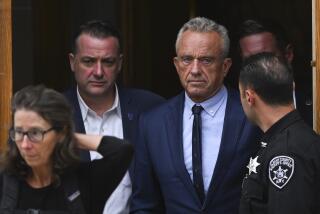Miller Doesn’t Testify : Defense Rests Case in FBI Spy Trial
- Share via
Moments after suffering the latest in a series of losing courtroom battles with the prosecution, defense lawyers for former FBI agent Richard W. Miller rested their case Thursday--without calling Miller to testify on his own behalf.
The conclusion of the defense case in Miller’s espionage retrial came after U.S. District Judge David V. Kenyon ruled that a military affairs writer from Mechanicsburg, Pa., William Kennedy, was not qualified to testify as an expert witness on Soviet KGB recruitment of American spies.
Kenyon ruled after U.S. Atty. Robert C. Bonner established that Kennedy, a former instructor at the Army War College and intelligence officer for the Pennsylvania Army National Guard, had never made a special study of KGB recruitment practices or testified before as an expert witness.
While the judge took more than half an hour to consider his decision not to permit Kennedy to testify, he gave a strong hint of his feelings just moments after hearing Kennedy detail his background:
“The defense says if this man knows more than the jurors, then he can testify,” Kenyon said. “If that’s the rule, we’re crazier than loons.”
Kennedy, who was not called by the defense in Miller’s first trial last year, had been expected to rebut prosecution testimony by KGB expert John Barron earlier in the trial that KGB recruitment involves luring an American spy out of the country.
Under questioning from Bonner, however, Kennedy, who said he writes on military affairs for newspapers, including the Christian Science Monitor, conceded that he had never written an article about KGB recruitment methods and had only written four paragraphs about the KGB in a book he co-authored, “Intelligence Warfare.”
Used Barron as Source
Kennedy also admitted that he had publicly credited a book by Barron about the KGB as one of his primary sources for his own writing about the KGB. He said he had read another book by an English author on KGB recruitment of British spies Kim Philby and Guy Burgess, but could not recall the title.
“I would submit Mr. Kennedy is not qualified to testify,” Bonner said. “He has absolutely no experience with having ever worked for a Western intelligence agency. He’s read two books, one of which he can’t remember.”
Kenyon, after considering the issue in chambers, announced that he would not permit Kennedy to testify as an expert.
“It would probably be very wise strategically for the court to let this fellow in,” he said, referring to a possible appeal if Miller is convicted. “But in good conscience the court cannot. He has made no special study of this field at all.”
Called 31 Witnesses
The defense presented 31 witnesses during 24 days of testimony in Miller’s second trial, with the first 13 days devoted to the testimony of convicted Soviet spy Svetlana Ogorodnikova, who was arrested along with her husband, Nikolai, and Miller on Oct. 2, 1984, on charges of conspiring to pass secret FBI documents to the Soviet Union.
Kenyon’s ruling on Kennedy was the latest in a series of setbacks for the defense. The judge earlier banned testimony by another expert witness on the impact of polygraph tests and ruled that the defense could not present Ogorodnikova’s previous denials of passing secret documents.
The government, which called 70 witnesses over a 28-day period in the first half of the trial, is expected to spend most of next week with testimony by prosecution rebuttal witnesses. The defense may then call its own rebuttal witnesses before the start of closing arguments.
The case is expected to go to the jury in mid-June.
More to Read
Sign up for Essential California
The most important California stories and recommendations in your inbox every morning.
You may occasionally receive promotional content from the Los Angeles Times.













